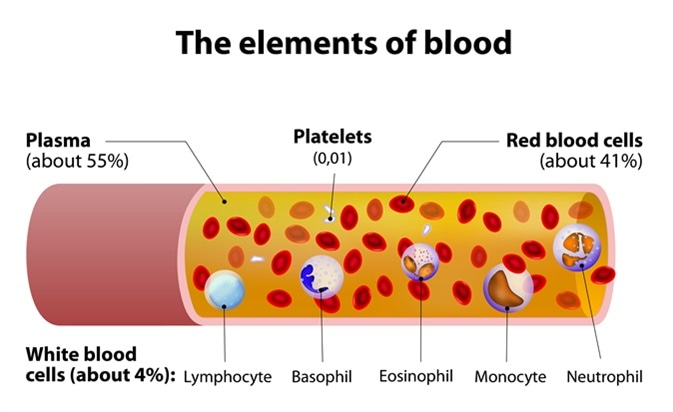Blood is made up of plasma and solid components. Of these, the larger part is plasma, comprising about 55%. It appears as a straw-colored fluid and is composed mainly of water, but also carries enzymes and salts.

The elements of blood. blood vessel cut section. Image Credit: Designua / Shutterstock
What Does Plasma Do?
Plasma is designed to carry nutrients, hormones, and proteins to the different parts of the body. It also carries away the waste products of cell metabolism from various tissues to the organs responsible for detoxifying and/or excreting them. In addition, plasma is the vehicle for the transport of the blood cells through the blood vessels.
Plasma Components
Plasma contains about 90 percent water, with 10 percent being made up of ions, proteins, dissolved gases, nutrient molecules, and wastes.
The proteins in plasma include the antibody proteins, coagulation factors, and the proteins albumin and fibrinogen which maintain serum osmotic pressure.
Each of these can be separated using different techniques so that they form various blood products, which are used to treat different conditions. For instance, clotting factors are used to treat coagulation disorders like hemophilia or disseminated intravascular coagulation.
Blood, Part 1 - True Blood: Crash Course Anatomy & Physiology #29
Specific Components and Their Function
The pH and osmotic pressure of blood are maintained by the plasma ions, proteins, and other molecules.
Plasma Proteins
Plasma proteins are the most abundant substances in the plasma and are present in three major types, namely, albumin, globulins, and fibrinogen. They play specialized roles as follows:
Albumin
Albumin helps maintain the colloid osmotic pressure of the blood. It is the smallest in size among the plasma proteins but makes up the largest percentage. The colloid osmotic pressure of the blood is important in maintaining a balance between the water inside the blood and that in the tissue fluid, around the cells. When the plasma proteins are deficient, the water in the plasma seeps out into the space around the blood vessels and may result in interstitial edema, a feature of liver disorders, kidney disease and malnutrition, for instance. Albumin also helps transport many substances such as drugs, hormones, and fatty acids.
Globulins
Globulins are of three types, alpha, beta, and gamma, from smallest to largest. Gamma-globulins are called antibodies. The alpha globulins include the high-density lipoproteins (HDL) which are important in carrying fats to the cells for building various substances as well as for energy metabolism. HDL is best known for its role in preventing plaque formation by keeping cholesterol in transport within the blood. Low-density lipoproteins (LDL) are beta globulins which transport fat to the cells for steroid and cell membrane synthesis. It also promotes cholesterol plaque formation which is a risk factor for arterial and heart disease.
Antibodies or gamma globulins are also called immunoglobulins. They are produced by the B lymphocytes, a subset of the immune cells. Antibodies are responsible for the body’s humoral immune function, recognizing pathogens via specific receptors and neutralizing them by various mechanisms.
Fibrinogen
Fibrinogen is an important soluble plasma clotting factor precursor, which is converted to a threadlike protein called fibrin on contact with a sticky surface. The fibrin threads formed in this way trap platelets to form the primary platelet clot on which a stable blood clot is formed by the process of coagulation.
Clotting Factors and Inhibitors
The clotting factors in plasma cause a blood clot to form at the site of any break in the smooth endothelial lining of the blood vessels. This not only prevents blood loss but protects the body against invading microbes.
Coagulation inhibitor proteins prevent the clotting of blood at unwanted locations or times.
Complement Proteins
The complement system is another important set of plasma proteins which are involved in immune and inflammatory reactions in response to many different infectious particles.
Other Functions
- Plasma proteins keep the blood pH slightly alkaline by binding excess hydrogen ions in the blood.
- Plasma proteins can also supply amino acids if required by being broken down by macrophages.
- Plasma proteins are also often carriers for small molecules, each binding after absorption from the gut with its own specific protein carrier for transport to the tissue or organ that uses it.
Other Plasma Components
Proteins
- Cytokines are cellular signaling molecules produced by cells in order to communicate with each other and to regulate important cellular processes.
- Hormones are molecules released by one organ or cell type to act upon another at a distant location, being carried through the bloodstream, to produce long-distance effects.
Electrolytes
Sodium is the most abundant ion carried in plasma and contributes most of the plasma osmolarity.
Amino acids
Tissues or plasma proteins may be broken down and the amino acids recycled for use in the synthesis of other biological structures. This may involve macrophages in the gut, the lymphatic system, and the lungs.
Nitrogenous compounds
Nitrogenous waste compounds such as urea are produced by the breakdown of various substances in the body. These are carried in the plasma to the kidneys to be excreted.
Nutrients
Nutrients absorbed from the gut or from other organs of origin are carried in the plasma, such as glucose, fats, amino acids, minerals, and vitamins.
Dissolved gases
Plasma also contains dissolved oxygen and carbon dioxide, in small amounts, as well as a significant amount of nitrogen.
Further Reading
Last Updated: Oct 10, 2018